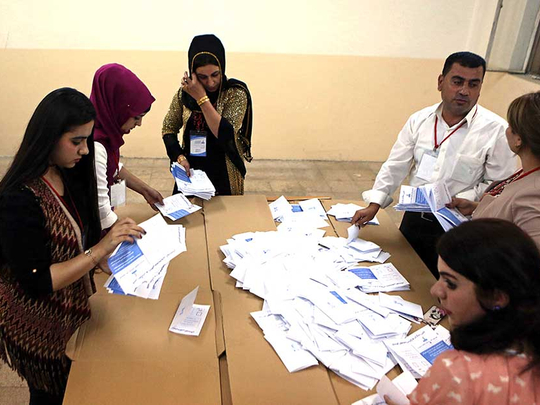
It would be a mistake not to see the recent Kurdish referendum as a historic action that has never been taken before. The overwhelmingly “yes” vote given by the Kurdish people to future statehood must be seen as a popular exercise in democracy which the central government of Iraq must pay heed to, try to come to terms with and seek to iron out but not at the expense of its unity. Although the government of Haider Al Abadi labelled the calls to hold a referendum as unconstitutional and illegal, nevertheless it should be given a thumbs up, a pat on the back and a three-cheers hooray for exercising self-restraint and letting the polls go ahead without a single glitch despite the rumblings in Baghdad and even military fanfare it has exercised with Turkish forces. These have been seen as precautionary rather than direct belligerent moves.
Despite the media ballyhoo about Iraq potentially cracking up, regional turmoil, anger of states like Turkey and Iran who have large Kurdish populations and might also clamour for similar plebiscites not to mention the views of America, Britain, France and Germany, the Iraqi Kurds have defied almost everyone. They went full throttle ahead and carried out what they long waited for and promised they would do and have a referendum under the noses of many disbelievers.
While it is still too early to see what will happen and how things will move from now on, or how the geography of the region is likely to change if at all, the Kurds of Iraq, which constitute around 6 million or 20 per cent of the Iraqi population, have demonstrated their will and shown not just the central government of Iraq but the whole world, they exist and want their voice to be heard from now on; which is why this is more worrying to Iran and Turkey because the Kurdish population is estimated in the region of 30-35 million and in territories in Syria and Armenia and where nationalistic feelings are likely to soar.
Popular move
In an effort to be more placatory, the Kurdish Regional Government in Arbil which long called for and organised the referendum, repeatedly said the poll — and a yes vote for statehood was long regarded as a foregone conclusion — is subject to a long process of negotiations with Baghdad and separation and/or statehood, is not around the corner and can’t be done overnight which is the picture that is mistakenly being projected in the media.
However, the first-time popular move, which many see as a potential dream-come-true for Kurds and certainly opening up the way for nationalist fervour, has already been regarded as non-binding on the Iraqi central government, which means that Baghdad can ignore it if it wants to. But this certainly would not be a wise decision because of what has been sanctioned by the Kurdish people. Despite this, the Baghdad government can now play the autonomous card since it had long granted the Kurdistan region a great deal of autonomy to exercise their rights on many aspects and as they see fit. What Baghdad might do, which would be politically wise, is grant more meaningful devolution to the Kurdistan regional government and federalism.
It must not be forgotten that the referendum was agreed upon by the Kurdish authorities to bring few home truths to the Baghdad central government and tell it they are frustrated and not happy with the way Baghdad conducts its own affairs. This includes the unequal relationship it has forged with the Kurdistan Regional Government and the unfair distribution of wealth from the oil revenues despite the fact major oil fields lie with Kurdish areas. The Kurds feel they have done much through their 200,000-strong Peshmerga force to defeat Daesh and boot them out of northern Iraq. They proved stronger than the Iraqi army in clobbering Daesh, (the self-proclaimed Islamic State of Iraq and Levant), but have not been given enough credit for this and are aggrieved by it.
Of course, and as a tangent, this is why the US and all the other dismayed countries are opposed to the referendum. They say its timing is wrong because of the fight against Daesh in northern Iraq. The mopping-up operations to get the country rid of the last bastions of this terror organisation might be derailed because of attention shifting to other issues that could be dealt with later.
But this may not be the case, because at least in northern Iraq Daesh is fighting with its last breath which is why it was probably ignored by the Kurdish authorities who went ahead with the referendum regardless of the post-electoral woes and worries. Indeed, now that the referendum is out of the way it would now be up to politicians in Arbil and Baghdad to start a process of soul-searching, not necessarily for Kurdish statehood, that can be foregone, but hammer out a meaningful framework that would be acceptable to all and preserve a national territory where Sunnis, Shiites have lived together and accepted each other. This would be the political challenge they have to shoulder rather than come up with easy solutions like splits and separations.
Marwan Asmar is a commentator based in Amman. He has long worked in journalism and has a PhD in Political Science from Leeds University in the UK.










